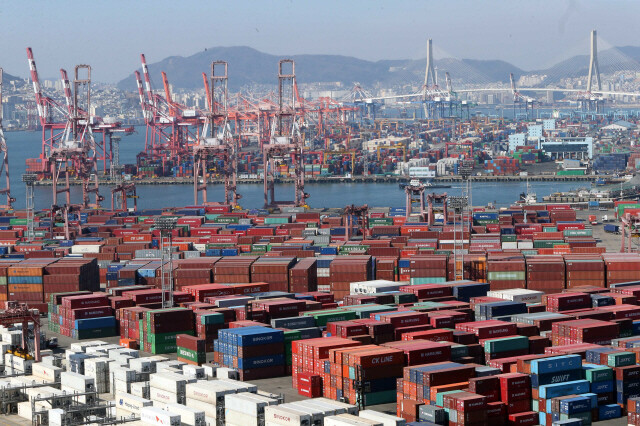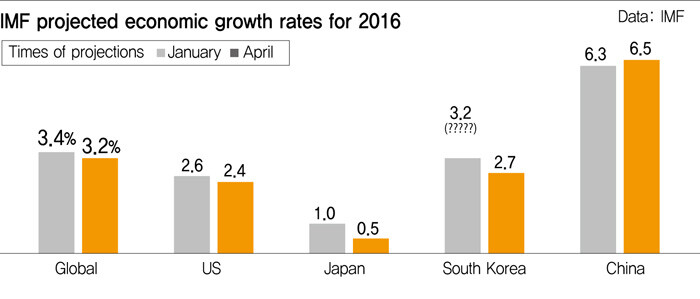hankyoreh
Links to other country sites 다른 나라 사이트 링크
[Editorial] Under this rudderless government, the economic future is bleak

Although the current situation of the South Korean economy is bad, its future prospects are even worse.
On Apr. 12, the International Monetary Fund (IMF) lowered its projection for South Korea’s economic growth rate this year to 2.7%. This is a 0.5 percentage point drop from the 3.2% projection that the IMF made in Oct. 2015.
The IMF also reduced its projected global economic growth rate from 3.4% to 3.2%.
The reduction of the projected economic growth rate had already been somewhat expected.
“Since the slump in exports is continuing and the recovery trend in the domestic market is slowing, it’s possible that this year’s growth rate will fall somewhat short of the 3% projected at the beginning of the year,” Lee Ju-yeol, governor of the Bank of Korea, told reporters on Mar. 30.
The South Korean government and the Bank of Korea predicted that the growth rate would fall in the 3% range this year, but domestic research institutes and overseas investors had already been predicting since last year that the growth rate would be in the 2% range.

If the South Korean economy only grows by 2% this year, it will mean that economic growth has remained in the 2% range for every year but one (2014) since Park Geun-hye became president in 2013. It will also mean that South Korea’s economic growth rate has trailed the global growth rate throughout her time in office. Low growth would seem to be becoming entrenched in the country.
The main reason the IMF gave for lowering South Korea’s projected economic growth rate was the slowing Chinese economy. As China reduces its imports, this has damaged economic projections for countries like South Korea that are highly dependent on the Chinese economy.
Indeed, South Korea’s exports have been declining for 15 straight months. The drop was particularly steep in the first quarter of this year, with exports down 13.1% from the same period in the previous year.
However, the South Korean economy‘s failure to emerge from the “low growth swamp” cannot be entirely blamed on the external environment. Since Park took office, all of the major economic indices have been worsening - not only exports, but also employment, income and consumption.
The youth unemployment rate in February was 12.5%, the worst level ever. Household income last year only increased 1.6% year on year, while consumption barely increased at all, by 0.5%. In contrast, household debt jumped by 11.2%.
When domestic or foreign conditions are poor, it is the role of the government to use aggressive fiscal policy to foster economic growth. But trapped by an unrealistic commitment to “welfare without a tax increase,” the Park administration has only increased the national debt and household debt while failing to bring about an economic recovery.
Despite this, Park is not changing a thing. During the cabinet meeting on Apr. 12, she expressed her concern that the National Assembly’s failure to pass bills related to the economy could cause a second economic crisis.
As long as the commander in chief keeps blaming other people like this, what chance is there that the economy will improve?
Please direct questions or comments to [english@hani.co.kr]

Editorial・opinion
![[Column] Has Korea, too, crossed the Rubicon on China? [Column] Has Korea, too, crossed the Rubicon on China?](https://flexible.img.hani.co.kr/flexible/normal/500/300/imgdb/original/2024/0419/9317135153409185.jpg) [Column] Has Korea, too, crossed the Rubicon on China?
[Column] Has Korea, too, crossed the Rubicon on China?![[Correspondent’s column] In Japan’s alliance with US, echoes of its past alliances with UK [Correspondent’s column] In Japan’s alliance with US, echoes of its past alliances with UK](https://flexible.img.hani.co.kr/flexible/normal/500/300/imgdb/original/2024/0419/2317135166563519.jpg) [Correspondent’s column] In Japan’s alliance with US, echoes of its past alliances with UK
[Correspondent’s column] In Japan’s alliance with US, echoes of its past alliances with UK- [Editorial] Does Yoon think the Korean public is wrong?
- [Editorial] As it bolsters its alliance with US, Japan must be accountable for past
- [Guest essay] Amending the Constitution is Yoon’s key to leaving office in public’s good graces
- [Editorial] 10 years on, lessons of Sewol tragedy must never be forgotten
- [Column] A death blow to Korea’s prosecutor politics
- [Correspondent’s column] The US and the end of Japanese pacifism
- [Guest essay] How Korea turned its trainee doctors into monsters
- [Guest essay] As someone who helped forge Seoul-Moscow ties, their status today troubles me
Most viewed articles
- 1[Column] The clock is ticking for Korea’s first lady
- 2After 2 months of delayed, denied medical care, Koreans worry worst may be yet to come
- 3Hong Se-hwa, voice for tolerance whose memoir of exile touched a chord, dies at 76
- 4[Column] Has Korea, too, crossed the Rubicon on China?
- 5[Correspondent’s column] In Japan’s alliance with US, echoes of its past alliances with UK
- 6Samsung barricades office as unionized workers strike for better conditions
- 7All eyes on Xiaomi after it pulls off EV that Apple couldn’t
- 8[Editorial] As it bolsters its alliance with US, Japan must be accountable for past
- 9[News analysis] After elections, prosecutorial reform will likely make legislative agenda
- 10US overtakes China as Korea’s top export market, prompting trade sanction jitters